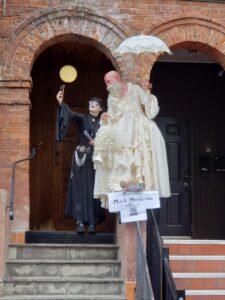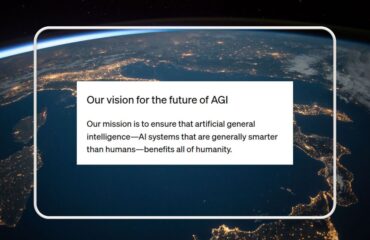
Performer at Toronto Pride celebration, June 25, 2023.
By James Myers
Let me explain the insight that this photo triggered.
It’s about norms – the behaviour that we could say is “generally accepted” during our daily work and home lives.
The robed figure in the photo, standing on a railing beside the store, is clearly something that is “out of the normal.” We don’t normally see such displays when walking up Church Street in Toronto. The photo, however, was taken on June 25. It was Pride weekend in Toronto, when many hundreds of thousands of people from near and far, people of all races, beliefs, sexual orientations straight and gay and otherwise, old and young, naked and clothed, disabled and able-bodied of all shapes and sizes, gather for a weekend of suspending the norms.
Suspending the norms is a human power that no machine algorithm could ever replicate.
I say that with certainty. I am certain that no algorithm could ever program the spontaneous expression of individual and collective creativity, liberty, and love that I witnessed on June 24 and 25, because so much of it was unexpected.
Algorithms don’t do a good job with the unexpected.
The machines and their algorithms don’t understand the art of being human. The human art is the art of birth and death, sickness and health, happiness and despair, hope and success and failure and love and hate and everything else that drives us to do what we do. The machine understands none of this. It is meaningless to the machine.
But it’s all of that emotional drive that has created 7.8 billion unique stories in the present, one for every one of us now living on planet Earth. And every one of our unique stories is backed by two other unique stories – one from each of our parents. No two of our stories are alike – each one of us walks a path in life through space and time that is different from anyone else’s path.
Computer algorithms are, by contrast to us unpredictable humans, tediously and undramatically the same. They’re designed that way – to follow the norm, which is their program.
The only time computer algorithms go beyond the norm, like HAL 9000 in 2001: A Space Odyssey, is when the human programmers fail to anticipate all the probabilities in the instructions they have encoded.
And humans fail to anticipate probabilities a lot. We make errors, and in designing machines to correct our errors we make errors in their coding and risk compounding the errors we were trying to correct.
But when we suspend the norms, anything is possible. That is when humanity is at its most creative.
We are a creative species. We have transformed an entire planet. We have diverted waterways, bulldozed mountains, built cities, and transformed Earth’s landscape. It seems that nothing on this planet is now beyond our reach.
But if we don’t suspend the norms, our reach is very limited. We see only one way of life, when in fact there are presently 7.8 billion ways of life, with many more in the past and many to come in the future. Tyrants draw their power from limiting their subjects to one way of life, but as humans we tend to dislike that type of restriction, because we find no happiness in it.
In human gatherings like this Pride weekend in Toronto, there’s no judgment. No one is hurt. It is a celebration. Sure, vendors make money selling drinks and flags and corporate products, but it’s not about the money. It’s about being happy. I didn’t see any unhappy people there, because happiness had become the norm – at least for one weekend.
The thing about money is that it is a terrible measure of happiness. I have encountered more than one wealthy individual suffering tragic unhappiness. If only they could set aside the pride of their wealth to attend a Pride event such as I did, and experience it as an ordinary human like me does, they might find that happiness is nowhere near as expensive as it seemed. Step out of the bubble and wade through the crowd like a normal human, looking at the faces to witness the happiness that I saw, and experience life as life naturally is.
The greatest happiness is free. That’s the power of humans, when we suspend the norms and explore our potential together. Put the algorithms aside and dare to differ. At the end of our lives, none of us will be able to take our money with us – all we can hope to leave behind is the sense that we made a difference. History proves that those who are remembered most fondly are the ones who made the greatest difference for the good.



